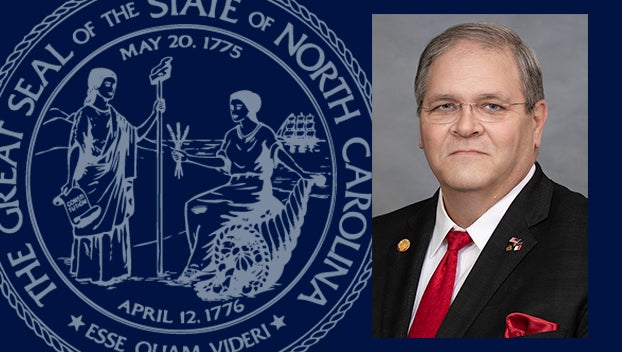Salvation Army begins signature fundraiser
Published 7:34 pm Friday, December 2, 2016

- TEAM EFFORT: The husband-and-wife team of Marlin and Jane Weaver served as bell-ringers for the Red Kettle site at Piggly Wiggly in Washington. (Chris Rawls)
There’s Black Friday — a day for spending money — the day after Thanksgiving. In the Washington area, the Red Kettle campaign to raise money for the Washington Corps of The Salvation Army also begins the day after Thanksgiving.
The Red Kettle campaign, according to Capt. Bruce Rabon with the Washington Corps, comes down to the community giving money, with that money going back to the community to help meet the needs of those who need assistance.
The Red Kettle’s goal this year is to raise $60,000. The campaign ends Dec. 24. Red Kettle sites are open each day, except Sundays.
“For the local Salvation Army, the Red Kettle is pretty much your biggest fundraiser of the year. People really need to understand all this money stays in the community. All the money that’s raised here in Beaufort County through the Red Kettle program stays in Beaufort County. It doesn’t go into a national account where it’s divvied up. Whatever we raise here makes up a big part of our local operating budget,” Rabon said. “It allows us to do our social services, where we help with utilities, food, rental assistance and clothing assistance.”
The Washington Corps serves Beaufort, Martin, Bertie, Washington, Hyde and Tyrrell counties.
Rabon said a good example of how Red Kettle funds are used is when local corps helped in the aftermath of the tornadoes in 2013. Red Kettle funds are not earmarked for specific needs; that money goes to address pressing needs, Rabon noted.
Area Red Kettle locations include, but are not limited to the following sites: Washington Walmart (both front entrances), Main Street in Washington, Walgreen’s in Washington, Belk in Washington and both Piggly Wiggly stores in the Washington area. There are counter Red Kettles at King Chicken, Dairy Palace and the No Wake Zone Grill. Red Kettles are also located in Williamston at Walmart, Belk and Rose’s.
Beginning today and on each Thursday, Friday and Saturday until the Dec. 24 deadline, Red Kettles will be manned by bell-ringers at area Food Lions, according to Rabon.
Although The Salvation Army relies heavily on volunteer bell-ringers from churches, civic groups, nonprofit organizations and other entities, sometimes it has to use paid bell-ringers. “The two (Washington) Rotary clubs compete with each other to see who can raise the most money,” Rabon said.
Volunteers to man the Red Kettle locations are still needed, he said.
“I look at the Red Kettle campaign as not a Salvation Army campaign but a community campaign,” Rabon said. “It’s really the community helping the community. … What we put into those kettles goes back to our communities. It may be your neighbor — that dollar you put into the kettle — your neighbor may be the one receiving help from that dollar.”
Rabon recalls the first time he rang the bell at a Red Kettle location. “I love ringing the bell. I was actually in Columbia, South Carolina, and I rang the bell from 10 (a.m.) to 8 (p.m.) six days a week for about six weeks. I’ve rang in the snow. I’ve rang in the sleet. I’ve rang in the rain. I love it,” he said. “There’s no greater opportunity, in my opinion, to have an impact on as many people with just a smile or a ‘Merry Christmas’ or a “God bless you’ in one day as you do with people passing you at that kettle. … A lot of folks don’t hear that on a daily basis. … What a smile means for some people means something totally different for others.”
To make an online donation to the Red Kettle campaign, visit https://give.salvationarmyusa.org/site/SPageServer/?pagename=redkettle_home.
History of the Red Kettle
When it comes to helping the needy at Christmas and other times, that’s where the Salvation Army’s annual Red Kettle drive comes in. The monetary contributions placed in those kettles manned by bell-ringers will help put food on the table, heat in the house and joy in the household. Giving makes the receiving possible, and some people need to receive the kindness of others.
Donations placed in those kettles provide Christmas meals, warm clothing and toys to families in need. Donations also help provide basic necessities, along with seasonal aid such as money to enable some people to pay their heating bills, according to the national Salvation Army’s Web site.
Does it seem like those kettles have been around for years? The Red Kettle tradition goes back to 1891 when Capt. Joseph McFee decided to provide Christmas meals for the poor in San Francisco. McFee had to find a way to pay for that food. It took several days for him to find the solution.
One day, the captain’s thoughts went back to his days as a sailor in Liverpool, England. On that city’s Stage Landing he saw a large pot called “Simpson’s pot,” into which charitable donations were tossed by passersby.
The next day, the captain received permission from San Francisco officials to locate a similar pot at the Oakland ferry landing, at the foot of Market Street. It was placed in a location easily seen by those going to and from the ferries. A brass urn was placed in a nearby waiting room in which ferry passengers could place donations.
These days, people place donations in the kettles — and the needy continue to benefit from the generosity of those who believe it is better to give than receive.
Source: The Salvation Army






